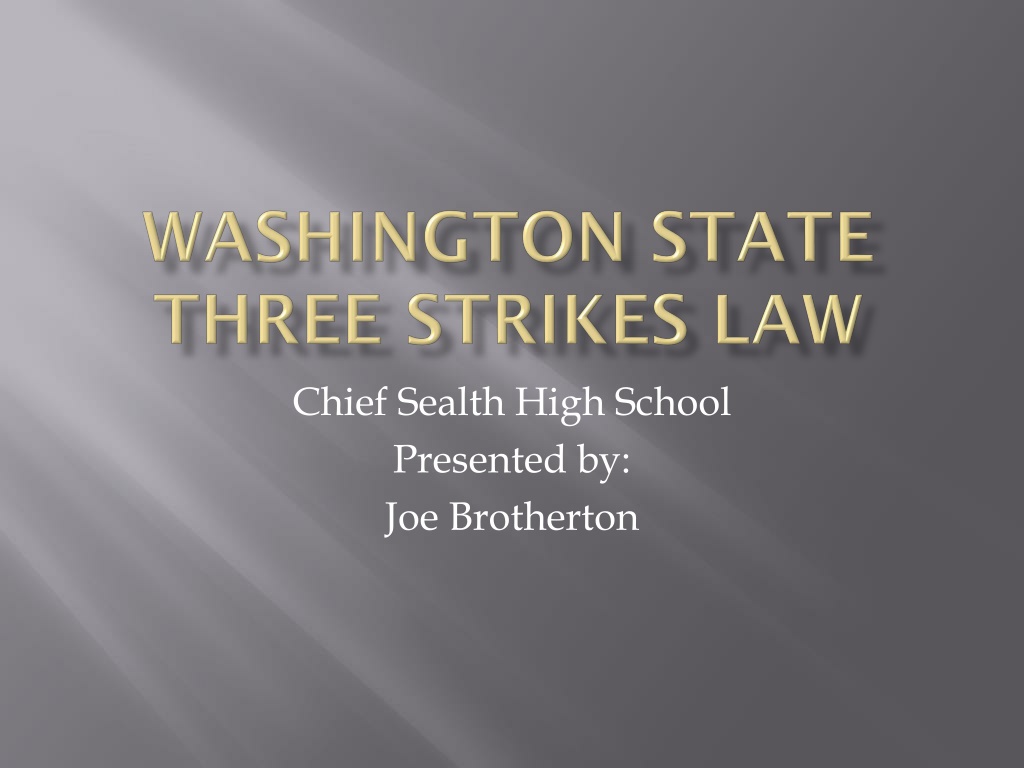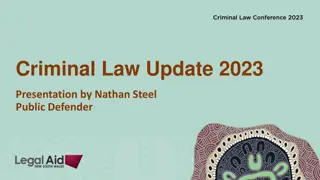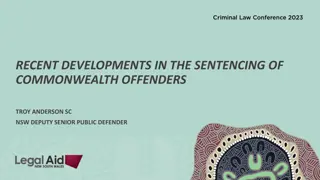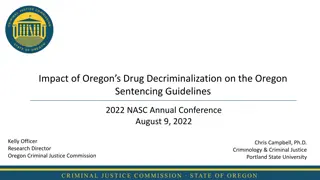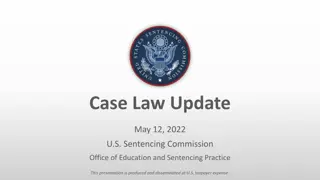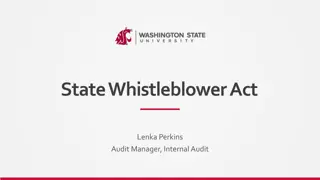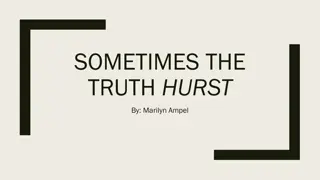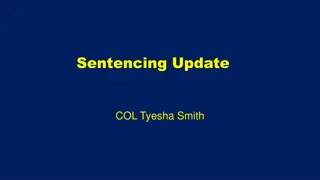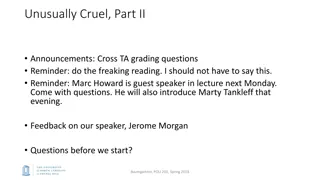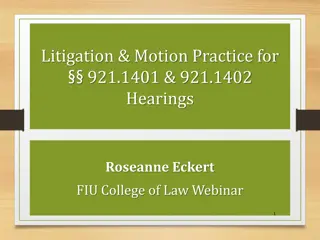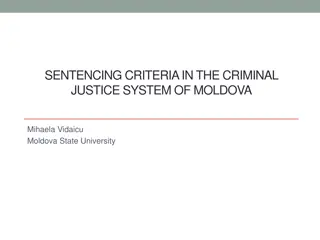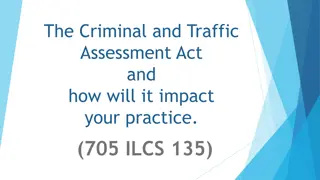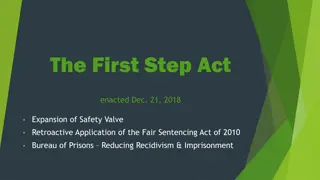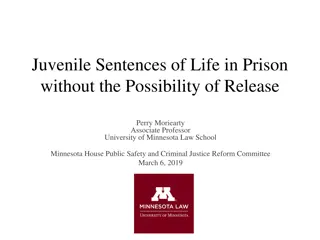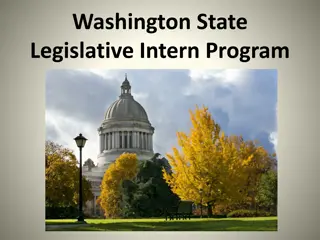Legal Measures and Sentencing in Washington State
This content provides an overview of various legal measures and sentencing practices in Washington State, including the treatment of persistent offenders, initiatives such as I-593, the role of the Washington State Constitution in approving laws, and the implementation of laws related to second-degree assault or robbery. It also discusses the impact of similar laws in other states regarding life imprisonment under three strikes provisions.
Download Presentation

Please find below an Image/Link to download the presentation.
The content on the website is provided AS IS for your information and personal use only. It may not be sold, licensed, or shared on other websites without obtaining consent from the author.If you encounter any issues during the download, it is possible that the publisher has removed the file from their server.
You are allowed to download the files provided on this website for personal or commercial use, subject to the condition that they are used lawfully. All files are the property of their respective owners.
The content on the website is provided AS IS for your information and personal use only. It may not be sold, licensed, or shared on other websites without obtaining consent from the author.
E N D
Presentation Transcript
Chief Sealth High School Presented by: Joe Brotherton
RCW 9.94A.570 Notwithstanding the statutory maximum sentence or any other provision of this chapter, a persistent offender shall be sentenced to a term of total confinement for life without the possibility of release or, when authorized by RCW 10.95.030 for the crime of aggravated murder in the first degree, sentenced to death. In addition, no offender subject to this section may be eligible for community custody, earned release time, furlough, home detention, partial confinement, work crew, work release, or any other form of release as defined under *RCW 9.94A.728 (1), (2), (3), (4), (6), (8), or (9), or any other form of authorized leave from a correctional facility while not in the direct custody of a corrections officer or officers, except: (1) In the case of an offender in need of emergency medical treatment; or (2) for the purpose of commitment to an inpatient treatment facility in the case of an offender convicted of the crime of rape in the first degree.
Initiative I-593 Passed in 1993 1993 crime was at a 60 year high Nearly 50% of the criminals convicted in the state had prior criminal histories 75% voted yes
The Washington State Constitution reserves to the people the right to approve or reject certain state laws through the process of initiative or referendum. Any registered voter can create an initiative by gather the appropriate number of signatures. Required number of signatures in 2014 - 246,372 Signatures must be validated. Initiative is added to ballot for the next election
Second Degree Assault or Robbery Taking of something by threat or use of force All other violent felonies 17 crimes in total Strikes prior to 1993 count against an offender. 1996 Two Strikes Law for sexual crimes 2008 added new crimes and included felonies from other states
Similar laws have been enacted in 29 states. As of March 2007, 292 individuals had been sentenced to life imprisonment under the three strikes provisions. Of these 40.1% were black and 57.3% were white. The most common third offense was Robbery 2 (23.3% of cases), followed by Robbery 1 (15.8%), and Assault 2 (8.2%)
Instructions: I will place out 5 placards Strongly Agree , Somewhat Agree , Undecided , Somewhat Disagree , and Strongly Disagree . I will read a question or statement. Move to the placard that best represents your opinion.
Someone convicted of 3 second degree robbery or assaults should be eligible to have their sentence reviewed. Does it matter if 2 of the strikes were obtained prior to 1993? Does it matter if all crimes were non-violent?
Currently there is no requirement to review the cases of 3 strike offenders. The only way to review the sentence is by the clemency board who can recommend the Governor grant clemency. The King County Prosecutor, Dan Satterberg, ordered a review of the first 20 three strike convictions. However the Prosecutor does not have the ability to change the sentences.
The sentence of life in prison without the possibility of parole for a 27 year old convicted of 2nddegree robbery or assault for the 3rdtime should be considered cruel and unusual punishment.
8thAmendment States: Excessive bail shall not be required, nor excessive fines imposed, nor cruel and unusual punishments inflicted. The punishment must match the crime. Supreme Court Cases: Ewing v. California, 538 U.S. 11 (2003), and Lockyer v. Andrade, 538 U.S. 63 (2003) The Court held that the life sentences imposed under the law are not so grossly disproportionate to the criminal history of a career offender as to violate the Eighth Amendment's prohibition against cruel and unusual punishment.
The three strikes law makes society safer and is an effective tool to combat crime.
Prosecutorial Discretion and Plea Bargains In a study of cases from 2003 through 2007, the King County Office of Public Defense found that 92% of defendants initially charged with a third strike offense ultimately received a sentence less severe than life without the possibility of parole. Clemency Board In December 2008, the state's clemency board held its first hearing on a prisoner held under the three strikes law. Pardon from the Governor Pardoning prisoners is not something incoming governors think about much. There is little political gain in it and much risk. The result is a system of clemency that can be unfair to prisoners and, says Satterberg, in some ways is unfair to the governor.
